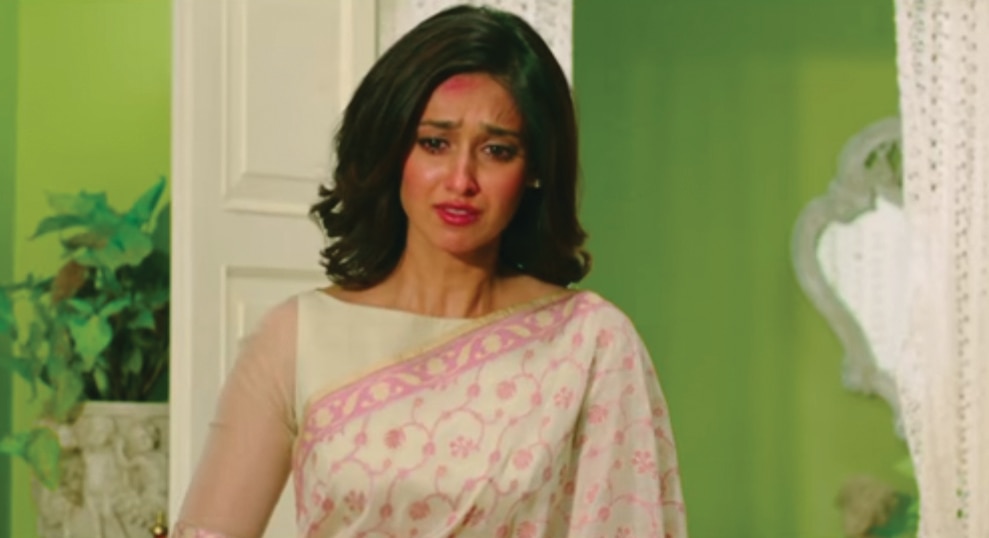Watching Rustom through a feminist lens

Rustom is the latest in the series of movies inspired by the epic tale of the Nanavati trial. The story of Rustom, Cynthia and Vikram approximately parallels the complicated triangle between KM Nanavati, his wife Cynthia, and her lover Prem Ahuja.
Rustom, a naval officer in the 1950s, discovers upon his return from duty that his wife has been having an extramarital affair with the charismatic Vikram. Half a day later, Vikram is shot dead, Rustom surrenders to the police and from thereon starts his jury trial for Vikram's murder - as much in the media and on the streets, as it is carried out in court.
 |
| Nobody seems to regard the wife's response as the internalisation of a victim-blaming discourse. |
The movie engages many interesting themes. It cleverly critiques trial by media, and plays on the irony of a state agent standing up against corruption, only to use his wife to extort money from the same corrupt players. However, by failing to incorporate a feminist understanding of violence and crime, the movie disappoints.
Since I had the pleasure of watching Rustom in my hometown, Lucknow, I could not but help track the audience's reaction to the movie. One scene stands out in particular.
Cynthia's housemaid, Jamnabai, is testifying in the court and lashes out against the judge with great rhetorical flourish, asking him if he would react any differently if he had found some other man had slept with his wife. At this point, the audience erupted in applause.
In fact, every time there was the suggestion in the movie that Rustom's act was morally justified (even if legally punishable), the audience cheered.
But here lies the problem. Rustom's valorisation is based on the regressive notion that men must act as the custodians and protectors of female "honour" (Chakravarti, 2005). "Honour" is, of course, linked to sexual purity, and the woman's sexual consent is irrelevant as long as her sexual relations are carried out only within the paradigm of a heteronormative marriage.
This explains why adultery continues to be an offence under the Indian statute book, though rape within marriage cannot be labelled as such (Section 375, Indian Penal Code 1860 (IPC), last amended in 2013).
In defending his wife's honour, Rustom, the "honourable murderer" is absolved not just by public opinion, but also by the jury.
In keeping with constructs of hypermasculinity, Vikram's murder was an acceptable, "manly" response to the situation. By crafting the story once again as a tale of "honour", the movie fails to problematise this understanding.
The only character in the whole movie who points out that Cynthia and Vikram were consenting parties is the victim's sister, Preeti, herself portrayed as the morally suspect, Hindi cinema "vamp".
Incidentally, Preeti's views seem to be in consonance with those of the UN Working Group on the Issue of Discrimination Against Women in Law and Practice, which has called for a decriminalisation of adultery inter alia on the ground that it violates the right to privacy of the parties involved.
Further, the story hinges not on whether Rustom expresses remorse for his murder, but on whether Cynthia is guilty enough about her infidelity. Strangely, while it is Rustom who has committed the crime of murder, it is Cynthia who is villianised.
Rustom's heroism draws at least partly from how he takes Cynthia back, and forgives her for the error of her ways. That she will forgive his criminal conduct is taken for granted. The taking of life is portrayed as less important than a woman's transgression of acceptable sexual mores.
Cynthia's culpability is so complete that even when she herself is victimised, she remains the wrongdoer. As she testifies about an act of violence perpetrated on her by her adulterous lover, she is asked whom she blames for what happened.
She breaks down, admitting that only she is to blame. This is what she must concede as an honourable wife, that she cannot simultaneously be transgressor and victim. Nobody seems to regard her response as the internalisation of a victim-blaming discourse, though Rustom is lauded once again, when he condemns the deceased Vikram for the infliction of violence on his wife.
Apart from some thought-provoking interventions, Bollywood is hardly at the forefront of the feminist struggle in India. Sultan, one of the most popular releases of 2016, has a central plot that is premised on the idea that when a woman says "no", she means "yes".
Sultan is able to make Arfa fall in love with him by contacting her "to foster personal interaction repeatedly despite a clear indication of disinterest" by her. This conduct is punishable as stalking under Section 354D of the IPC. Arfa's character finds it irresistible though, thereby completing the glorification of this criminal offence.
Yet, Bollywood has a tremendously important role to play in the creation of popular culture in India. It is uniquely positioned to be a potent feminist ally and to challenge structures of gendered (and other) oppression.
It is hoped that by responding to feminist critiques, the industry will continue to realise its subversive potential instead of reinforcing problematic gender scripts, as Rustom does.

